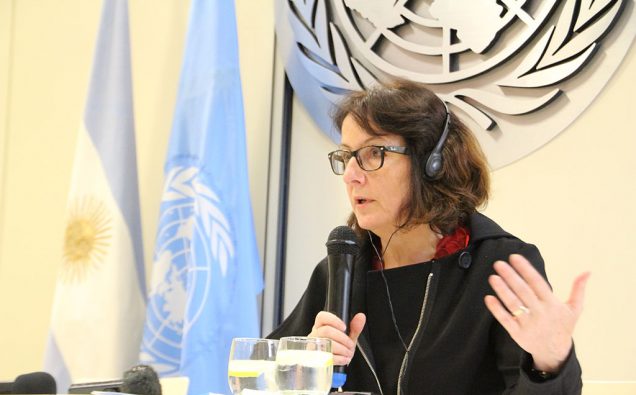
Special Rapporteur on violence against women, Dubravka Simonovic, speaks to the press in Buenos Aires, November 21, 2016. Photo UNIC /Buenos Aires.
Women’s rights have been set back in several places even as awareness about human rights has increased. Besides’ conflicts, ancient biases and discriminatory practices in deeply conservative societies and many forms of restrictions on rights of women, two recent issues including political populism and fundamentalism are also hurting drives toward ensuring women enjoy their rights.
The United Nations is warning that women defending human rights are facing worsening obstacles amid a global trend of fundamentalism and populism.
“In the face of rising populism and fundamentalism and deplorable setbacks on the women’s human rights agenda, we need more than ever to unite our forces to preserve the democratic space in which women human rights defenders represent an essential counter-power and a colossal force of action,” a joint statement issued ahead of International Women Human Rights Defenders Day on Nov. 29.
Women working for rights and equality faced unique and growing challenges driven by deep-rooted discrimination, with some being killed for their courageous stand and others facing violence, harassment, social stigma and sometimes imprisonment, experts note.
“Every day, more women identify themselves as human rights defenders and undertake individually and collectively actions in pursuit of justice, equality, peace, and human rights for all,” they said, paying tribute to the hundreds of thousands of women working for equality and women’s rights around the world.
“However, this participation has been limited by the discrimination which confronts women throughout the world. The very concept of feminism is too often misunderstood, denigrated and discredited, even by some in the human rights community,” experts said, according to a UN statement.
![By English: Unknown Français : Anonyme (Marie-Lan Nguyen (User:Jastrow), 2008-04-11) [CC BY 2.5 (http://creativecommons.org/licenses/by/2.5)], via Wikimedia Commons](https://www.viewsnews.net/wp-content/uploads/2016/11/Bronze_young_girl_reading_CdM_Paris-848x1024.jpg)
Photo Unknown Français : Anonyme (Marie-Lan Nguyen ( via Wikimedia Commons) shows a statue of a young Roman girl reading after a Hellenistic model in Rome
The UN experts include Alda Facio, Chairperson-Rapporteur of the Working Group on the issue of discrimination against women in law and in practice; Michel Forst, Special Rapporteur on the situation of human rights defenders; and Dubravka Simonoviæ Special Rapporteur on violence against women, its causes and consequences.
According to the statement challenges faced by women rights defenders include misogynistic attitudes, threats of sexual assault, travel bans, lack of protection and access to justice, imprisonment, killings, laws which violate their rights, gender-based defamation questioning their “femininity” or sexuality, and gender stereotyping which questions their engagement in public life instead of sticking to their caretaker role in the family.
Women who denounce violence against women, particularly in rural or semi-urban areas, are also at high risk, along with those living in conflict areas and those facing social stigma because of their ethnicity, disability, age or sexual preference.
The experts pointe out that “this discrimination inhibits and discourages women who are agents of change but, out of fear of reprisals, do not even dare to identify themselves as human rights defenders.”
The UN said experts have urged all States to ratify and fully implement the Convention on the Elimination of All Forms of Discrimination against Women (CEDAW) and the milestone 2013 UN General Assembly resolution on protecting women human rights defenders,” which requires Member States to take concrete measures to end gender discrimination.

















